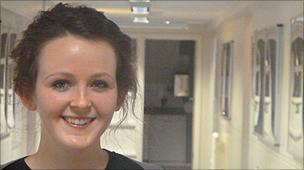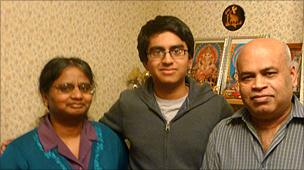Five ways to get into Oxford
- Published
- comments

Oxford interviews can be daunting experiences
Oxford University has finished selecting its new intake of students for 2011. It's a world-famous institution that has educated 25 British prime ministers. So what's the secret to getting in?
Thousands of students have now heard whether they have been offered places at Oxford University.
For those that have nervously opened the envelope to find good news, they have the added satisfaction of knowing they succeeded in what the university says was the most competitive year yet. More than 17,200 people were chasing 3,200 places.
The application process has a daunting reputation and, for state school pupils, it can seem especially difficult. While only 7% of pupils in England and Wales are from the independent sector, they make up around 46% of Oxford's undergraduates.
The university says these stats don't tell the whole story, because a third of students with all A grades in their A-levels - the pool of talent from which Oxford students are drawn - are privately educated.
Getting in is hard, but perhaps not as hard as people think, says Mike Nicholson, the university's head of undergraduate admissions, with on average five applications for every place.
"We're looking for students who are intelligent - very interested in their subject and who can demonstrate their interest," he says.
So what are the ingredients of a successful application?
1. HAVE CHUTZPAH
A touch of impudence can go a long way, says Mark Robinson, head of history at Barton Peveril College in Eastleigh, a state school with a good track record of getting students into Oxford.
"It's about having confidence in your own opinions, even when someone else says 'that couldn't be right'.
"Rather than the pupil giving ground, saying 'oh dear, silly me', we want them to say 'don't be ridiculous, of course that's the case'.
"It's an adversarial style of discussion. When we do our mock interviews and extra lessons with history students, I encourage them to argue."
The small class sizes of independent schools help cultivate this skill because they make pupils feel special and give them a sense of entitlement, he says.
Pupils who stick up for themselves stand out, says Oxford professor Thomas Noe.
"What we are looking for is a student who can address issues in a logical fashion, reason from premises to conclusion, we're looking for someone who can stand up for their own ideas but is not particularly inflexible."
Even if a student is hesitant or shy, how well he thinks will still be evident, he says.
2. UNLEASH YOUR GEEK
Extra-curricular activities are not that important, says Mr Nicholson.
"There is a presumption that if applying to Oxford, you have to be incredibly well-rounded.
"It's not good enough just to be academic. You have to have climbed Mount Kilimanjaro, raised £10,000 for charity and rescued three children from a burning building, all these fantastic achievements. You don't."
Some students have well-rounded activities and some don't. But they are all smart and that's the key, he says.
3. BE PASSIONATE
It's important to communicate your enthusiasm for your subject and not appear like you're regurgitating lines, says Bethany White, 17, who is heading to Mansfield College to study language and literature.

Show passion, says Bethany
"It was all natural. When I was talking, I hadn't planned anything and maybe that helped. I didn't have preconceived ideas. it was spontaneous."
Go for it and be yourself, adds Bethany, from Taunton's College in Southampton.
"And your passion really. The enthusiasm and passion is really important, and if you haven't got that then don't bother."
4. PUT IN THE HOURS
At some schools, like Barton Peveril, students in their final year complete nearly four hours a week of extra classes in preparation.
Showing a knowledge beyond the A-level syllabus is crucial, and that's what makes the interview the most important part of the application, says Sos Eltis, an English tutor at Brasenose who teaches other Oxford professors how to interview.
It's about identifying the pupils who think more widely, she says, for whom A-levels seem to hold them back.
"You can't see that from paper alone. You have to interview them."
There is also a programme of week-long, residential classes over the summer, run by the university, called Uniq.
Lawrence Holdsworth, 18, who will study history at Somerville College, says it made all the difference to him.
"The Uniq summer school gave me a good taster of the teaching system which was something that I really enjoyed. The debating that comes with it and how you get to explore matters and really go off on a tangent. That is something I definitely advise."
5. GO TO A SCHOOL WITH KNOW-HOW
Schools can develop relationships with colleges, says Mr Robinson. Once you get a student into a college, he says, that college will often write and ask for more.
Anyone can get into any Oxford college, but some colleges seem to take students from the same schools year after year.

Ragulan credits his family
Families also play a big part in providing the right encouragement and work ethic at home.
Ragulan Vigneswaran, 17, says his Sri Lankan parents have been a big factor in his success in getting to Balliol College.
"From a young age, my parents really tried to instil into me that education is pretty much the most important thing.
"My mother I remember was teaching me maths from a really young age because she wanted me to become really adept at it and become passionate in the subject in the way she was.
"They have been supporting me continuously and encouraging me to study more - encouraging out of school study - to make myself more knowledgeable and prepared for the future."